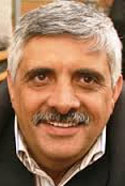End the Infighting and Honour Nakba

By Daoud Kuttab
15 May 2015
On May 15, each and every year, Palestinians remember the sad memory of their dispossession.
The Nakba or "catastrophe" - the dispersal of the Palestinian people to the four corners of the world - continues to be the primary source of anger and resentment for generation after generation of Palestinians.
Statistics produced this week point out that the Palestinian population has reached 12 million, of which only four million live in the occupied West Bank and Gaza, with a further 1.8 million living in Israel and the rest living outside historic Palestine. Jordan has the highest population of registered Palestinian refugees, numbering more than two million.
Contrary to what many Israelis often say, the "catastrophe" refers not to the creation of Israel, but the disintegration of national Palestinian unity, identity and cohesion.
True, the PLO has helped reunify the Palestinian national identity since 1948, but the reality on the ground shows that Palestinians have different goals depending on where they are now.
Quest for equality
Palestinian citizens of Israel are seeking equality. In Jordan, where Palestinians are citizens, they are pushing for a greater political role in their country of residence. In Syria, meanwhile, the remaining Palestinian refugees in Yarmouk camp just want to survive.
Palestinians in various diaspora countries have done well, both professionally and politically. Many world citizens of Palestinian origin have succeeded in reaching senior political positions in their countries - Palestine has provided presidents to both Honduras and El Salvador, for example - and Palestinians can be found in a variety of prominent parliamentary roles in Europe, Australia, and the Americas.
Some 67 years after this human tragedy, Palestinians continue to clutch to the hope of the right of return - most frequently symbolised by the chunky metal door keys still held by many which once unlocked family homes now lost to European immigrants of Jewish descent.
Palestinian aspirations to return are more romantic than realistic. After 67 years, most refugees and their descendants are now settled. They have built homes and created new lives despite their commitment not to forget their homeland.
But while most Palestinian refugees would be unlikely to actually opt to return to their original homes, the pain and passion will never be calmed until the right to do so is implemented for those who do want and need to return.
The creation of a Palestinian state that is truly independent and contiguous will go a long way in satisfying this Palestinian yearning. No one expects that the entire Palestinian refugee population will return, but all demand that the right to do so is addressed.
Israel, as the party that created this decades-long tragedy, must have the courage to admit its legal and historic responsibility, and agree to allow a percentage of those who were forcibly kicked out of their homes to return in an organised and honourable fashion.
Thirst for return
What would quench this thirst to return is not whether, after 67 years, millions of Palestinians might tomorrow leave their new homes to return to what has become the recognised state of Israel within the 1967 borders; the Palestinian passion for return will only be satisfied once the Palestinian national struggle for liberation is realised at least on some part of historic Palestinian lands. The two-state solution is therefore not a resolution simply for the four million Palestinians living under occupation, but a national solution that addresses the aspirations of all Palestinians, everywhere.
The failure of Israel and the international community to satisfy Palestinian aspirations should not divert our attention from some of the mistakes that Palestinians are committing through their internal divisions. Accomplishing the right of return and statehood requires a unified national strategy in which all parties have a stake.
As long as Palestinians are unwilling or unable to put aside their petty differences, it will be difficult to use the full potential of all Palestinians and their friends around the world.
As we remember 67 years of the catastrophe that befell Palestinians, it is important that we don't lose focus on the importance of the immediate goal that all Palestinians can unify around - namely, the creation of a Palestinian state within the 1967 borders.
International support - including the nonviolent actions of boycotts, divestment and sanctions movement - are key to realising Palestinian aspirations and to help heal the deep pain caused to the Palestinian nation 67 years ago.
Daoud Kuttab, an award-winning Palestinian journalist, is a former Ferris professor of journalism at Princeton University.
Source: http://www.aljazeera.com/indepth/opinion/2015/05/infighting-honour-nakba-150514110645365.html




 Moderate Islamist here
Moderate Islamist here


0 comments:
Post a Comment